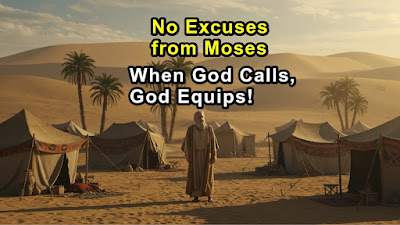"When Excuses Sound Reasonable: Trusting God’s Call"
Text: Exodus 3:11–4:17
Have you ever felt unqualified for something important—something bigger than you? Maybe you were asked to lead, to speak up, to take on a role you didn’t feel ready for. Most of us have. And in those moments, we often offer what seem like perfectly reasonable excuses.
Moses did the same. In fact, his objections to God’s call are so familiar, so human, that we might be tempted to sympathize with him completely.
But the story of Moses shows us something powerful: God is not interested in how qualified we feel. He’s interested in what He can do through us—if we trust Him.
Reasonable Excuses, Divine Response
Let’s look at Moses' objections in Exodus 3–4:
-
“Who am I?” (Ex. 3:11)
Moses begins with a deep sense of inadequacy. He’s a shepherd, not a diplomat. He tried to help his people once and failed.God’s reply? “I will be with you.”
God doesn’t boost Moses’ ego; He shifts the focus. The success of the mission won’t depend on who Moses is, but on who God is. -
“What if they don’t believe me?” (Ex. 4:1)
A fair question—after all, Moses had no official credentials.God responds by giving him signs—a staff turned to a snake, a leprous hand healed, water turned to blood.
In other words, God equips him with more than words: He provides evidence of divine backing. -
“I am slow of speech and tongue.” (Ex. 4:10)
Moses is convinced he’s the wrong man for a speaking job.God replies, “Who gave human beings their mouths?” and promises, “I will help you speak and will teach you what to say.”
-
“Please send someone else.” (Ex. 4:13)
At the core of all his excuses is fear and reluctance.God becomes angry—but even then, He accommodates Moses by sending Aaron to speak for him.
Each time Moses gives an excuse, God doesn’t say the concern is totally false—but He reminds Moses that the call isn’t based on human ability. It’s based on divine power and presence.
Lessons for Us Today
-
God Calls Imperfect People.
The Bible is full of them—Abraham the doubter, David the sinner, Jeremiah the weeping prophet, Peter the denier, Paul the persecutor. Why? Because God delights in showing His strength through human weakness. -
Excuses Often Reveal Fear, Not Fact.
Moses’ excuses sounded logical, but underneath was fear. That same fear grips us—fear of failure, fear of rejection, fear of not being enough. But faith begins where fear ends—with trusting God more than our own perceptions. -
God Provides What We Need—When We Obey.
God didn’t give Moses everything up front. As Moses stepped forward in obedience, God supplied what he needed. It’s the same with us. Provision often follows obedience. -
God’s Presence is Enough.
The answer to every excuse was the same: “I will be with you.” That’s the same promise Jesus gave to His disciples in Matthew 28:20—“And surely I am with you always, to the very end of the age.”
Trusting the God Who Calls
If we only followed God’s call when we felt fully ready, few of us would ever take the first step. But the call of God doesn’t depend on our confidence; it depends on His presence and power.
So, what is God asking of you today?
Is He calling you to step out in ministry, to serve, to lead, to speak, to forgive, to change direction?
You might have a list of reasons why you can’t. Moses did too.
But in God’s hands, even the most ordinary person can do extraordinary things.
Let’s lay down our excuses and pick up trust.
Let’s believe that the One who calls us is faithful—and He will do it.
“Faithful is He who calls you, and He also will bring it to pass.” – 1 Thessalonians 5:24
Prayer:
Lord, You know our hearts. You know our fears, our doubts, and the excuses we carry. Help us lay them down at Your feet. Teach us to trust not in our ability but in Your power. Use us, Lord, not because we are able, but because You are. In Jesus’ name, amen.
More: EXODUS - Sabbath School Lesson 2 - The Burning Bush

